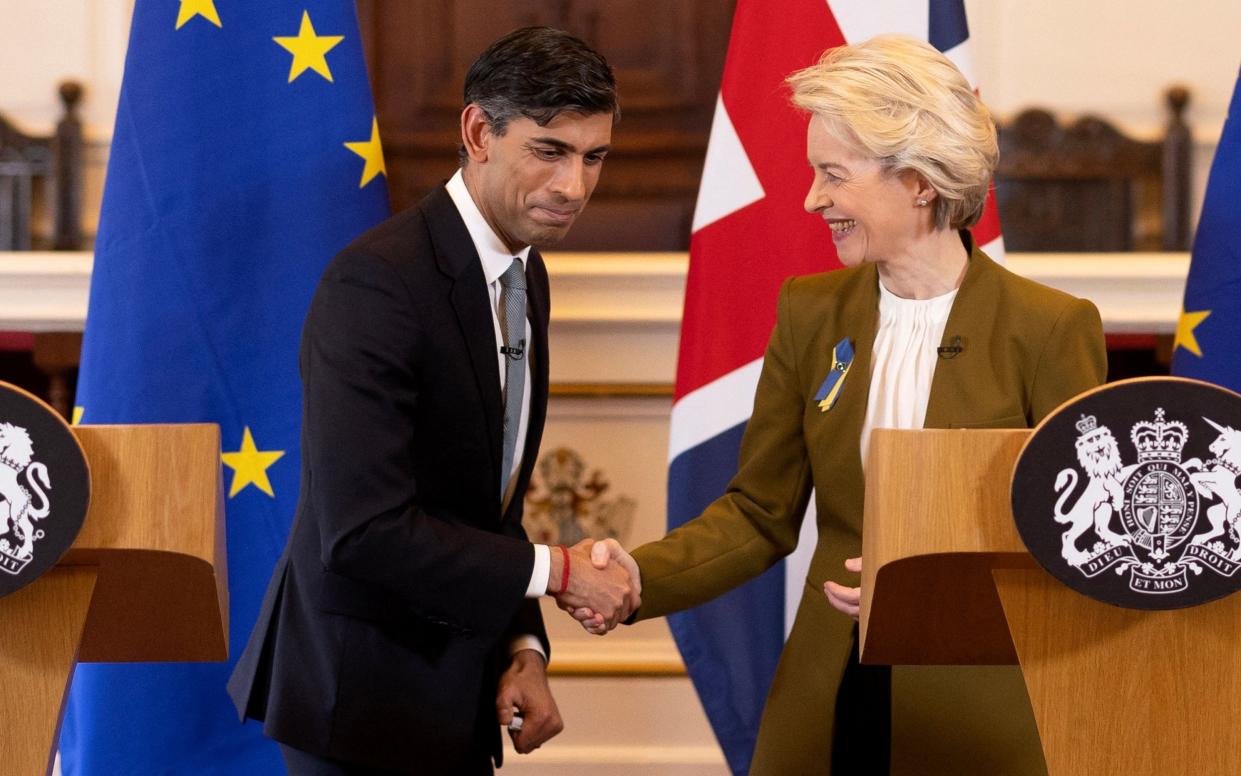Britain is paying the price for surrender to the EU

The Northern Ireland High Court has dealt another blow to the Government’s policy of stopping the boats by deporting illegal migrants to Rwanda. Mr Justice Humphreys has ruled that a number of key sections of the Illegal Migration Act 2023 are not to apply in Northern Ireland.
This means that illegal migrants who think they might be at risk of being deported to Rwanda (if the flights ever get going) could move to Northern Ireland in order to avoid removal. If significant numbers take this course, this could impose serious stresses on the province.
The Government intends to appeal against this judgment to the Northern Ireland Court of Appeal, and from there it might go to the Supreme Court. There are legal arguments that this judgment is wrong and so it might be reversed in the higher courts. But the Government has already suffered a number of setbacks and disappointments in those courts on its Rwanda policy, so it is by no means guaranteed that it will be reversed.
The reason why this judgment is so significant is that it involves a court actually setting aside an Act of Parliament on human rights grounds. For all the faults of the Human Rights Act 1998, this cannot be done under that Act. Instead, the court has used the Northern Ireland Protocol (rebadged last year with minor changes as the “Windsor Framework”) as the legal basis for disapplying an Act of Parliament.
The idea that courts could disapply Acts of Parliament was a revolutionary concept, which came into being when we were members of the European Community (later the European Union). Because Community law (later called EU law) claimed supremacy over the laws of member states, our courts decided that they had the power and duty under the European Communities Act 1972 to disapply UK Acts of Parliament if they conflicted with the EU treaties or with EU law.
This should have ended – completely and for good – when we left the EU. But Theresa May’s disastrously botched Withdrawal Agreement accepted the principle that a large range of EU laws, together with Luxembourg Court jurisdiction, should continue to apply in Northern Ireland after we left. Boris Johnson’s renegotiation made some important changes to the way customs rules would operate in Northern Ireland, but left the rest of the disastrous May structure intact.
That included agreeing to give supremacy to EU laws in Northern Ireland over all UK laws. Therefore, the Act that gave effect under UK law to the Withdrawal Agreement and the Northern Ireland Protocol contains section 7A, which is effectively copied out from the old repealed 1972 Act and gives supremacy to the Protocol over all UK laws.
The Protocol also contains a vaguely worded Article 2(1), which enjoins the UK to ensure that there be no diminution of rights, safeguards or equality of opportunity in a number of wide areas.
The Northern Ireland High Court has interpreted this as giving continuing effect in the province to many effusive and vague EU rules in the area of asylum and human rights. It has so concluded that a number of key sections in the Illegal Immigration Act should be disapplied in Northern Ireland because of conflict with EU rules.
It is quite shocking that the Government should have allowed this to happen. It was warned. In December last year, a group of lawyers, including myself, assessed the Rwanda Bill and warned that it would not achieve its objectives unless it were tightened up. We specifically raised the danger posed by the argument under section 2(1) of the Northern Ireland Protocol and suggested that a clause be inserted in the Bill that would exclude the Protocol from interfering with deportations to Rwanda.
The Government ignored both that and other warnings, and instructed its whips to get Conservative backbench amendments voted down which would have rectified these problems.
Worse than that, earlier last year, Rishi Sunak decided to abandon a Bill that had gone through all stages in the House of Commons and would have enabled EU laws to be removed from Northern Ireland.
Instead, he negotiated the so-called Windsor Framework with the EU. This left almost all EU laws in place in Northern Ireland (despite false claims by the Government to the contrary). In return for some limited easings of formalities on trade across the Irish Sea, it conceded the vital principle that EU foreign laws and foreign courts should continue to apply in Northern Ireland and be supreme over our laws.
Both on the Rwanda policy and on Northern Ireland, we have seen from this Government and Prime Minister a pattern of tough talking and boastfulness, but spinelessness and incompetence in actually standing up for the vital interests of this country against the out-of-control European human rights establishment or the European Union.
Regrettably, as the general election approaches, I fear we are likely to see even more of this pattern. This Northern Ireland court case is just the latest example.

